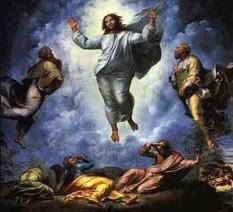Senator Barack Obama
recently expressed confusion over what the Bible teaches on homosexual unions, and suggested the Sermon on the Mount (Mt.5:1-7:29) for clarification.

This struck me as sage advice, so as a Lenten exercise, I have prayerfully reviewed that passage, with an eye especially for anything regarding homosexuality.
The Sermon on the Mount is, of course, a deep and multi-layered discourse, saying much about the path to God and the life of faith, containing way too many profundities to even mention in one blog post. Here are just a few little thoughts:
Early in His discourse (Mt.5:17-20), Jesus declares that He has come, not to abolish or diminish Old Testament teachings, but to fulfill them, to enlarge upon them. Now, it is well known that homosexual activity is categorically condemned in the Mosaic Law of the Old Testament. In Leviticus 20:10-16, for example, homosexuality is listed along with adultery, incest, and bestiality as the capital sexual sins, i.e., deserving the death penalty. So, as to the special focus here, Jesus would seem to be confirming and even strengthening the Mosaic prohibition against homosexual acts. This becomes even clearer in the remainder of chapter 5 (Mt.5:21-48), where Jesus gives six instances of His fulfilling or strengthening of O.T. precepts. In each example - murder, adultery, divorce, oaths, justice, and love - the commands of Jesus go beyond what the O.T. required; His commands are stricter and more comprehensive than the Mosaic statutes. Note that adultery, one of the capital sexual sins, is explicitly included. Not only is adultery condemned by Jesus, but even the lustful thoughts leading up to the actual adulterous act. One would have to conclude that the same principle applies to the other capital sexual sins as well: that we must be vigilant against the very thoughts and intentions leading up to the actual sins of incest, bestiality, and homosexuality.
 As noted in a recent post, many have interpreted Mt.7:1 ("Judge not, lest ye be judged") as somehow providing license for all kinds of moral mischief. But the context (Mt.7:1-5) clearly talks about judging rightly, with clear vision. It condemns the condemning of certain behavior in others while excusing the same behavior in ourselves. It may also prohibit judging the inner secrets of another's heart which we cannot know. But in context it cannot reasonably mean that we must approve or condone sinful behavior, either in ourselves or in others. The apostles, the prophets, and Jesus Himself constantly exposed and judged sinful behavior.
As noted in a recent post, many have interpreted Mt.7:1 ("Judge not, lest ye be judged") as somehow providing license for all kinds of moral mischief. But the context (Mt.7:1-5) clearly talks about judging rightly, with clear vision. It condemns the condemning of certain behavior in others while excusing the same behavior in ourselves. It may also prohibit judging the inner secrets of another's heart which we cannot know. But in context it cannot reasonably mean that we must approve or condone sinful behavior, either in ourselves or in others. The apostles, the prophets, and Jesus Himself constantly exposed and judged sinful behavior.
The principle is profound but simple: love the sinner, hate the sin, both in ourselves and in others. To excuse sin is to belittle God's law and His holiness. To truly love the sinner (including myself), I must hate the sin which encumbers the sinner and keeps him from God. To excuse sin is to ignore the sinner's moral danger, and so to despise the sinner himself.
This principle applies to the special focus. Currently, many who profess the Christian faith have singled out homosexual behavior as something to be lauded or affirmed, rather than repented of as sin. This turns out, ironically, to be the ultimate homophobia. By their unwillingness to call this particular sin a sin, such Christians place a huge stumbling block in the path of their brothers who are so tempted. They single out homosexuals from other sinners, excusing them from the need for repentance, thus depriving them of the saving grace of repentance and forgiveness, and thus consigning them to eternal perdition. This is serious hatred! In contrast, Jesus loves the homosexual, and so calls him to repent. As with all sin, this is the only path to salvation and sanctity.
In Mt.7:13,14, Jesus warns us to avoid the easy way leading to destruction, then warns of false prophets (Mt.7:15-20), which also seems germane to the special focus. In the closing paragraph (Mt.7:24-27), Jesus gives another solemn warning: heeding His teachings leads to life and strength, ignoring them leads to collapse.
For once, the senator from Illinois got it right: the Sermon on the Mount has much to say on this and on many, many other issues. It is highly recommended reading.
And so it is out of love (not "animus") and prudent concern for the common good (not "prejudice"), that we pledge to labor ceaselessly to preserve the legal definition of marriage as the union of one man and one woman and to rebuild the marriage culture. How could we, as Christians, do otherwise?













